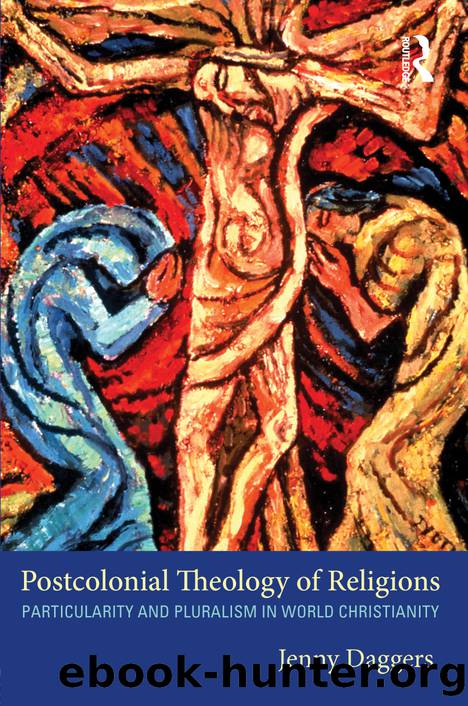Postcolonial Theology of Religions by Daggers Jenny;

Author:Daggers, Jenny;
Language: eng
Format: epub
ISBN: 1209564
Publisher: Taylor & Francis Group
Eurocentrism in the spotlight: whiteness made visible through intercultural global feminist theology
Inscribed within the story of emergent white second-wave feminism and feminist theology is the tale of the troubling of an assumed identity between the experience of white, western, middle class and heterosexual women and some universalized âwomenâs experienceâ. The crucial reality in play here is that dominant categories are invisible to those who are advantaged by them. It is difficult for those who live out heterosexual privilege to be aware of their advantage, without readiness to learn of this from the queer perspectives of lesbian/gay/bisexual/transgender commentators. Similarly, the âsubjugated knowledgesâ of women who are disadvantaged in terms of their âraceâ, class, or disability cannot be accessed directly by women who are privileged in these terms. As Latin American liberation theologians were to insist, âthe poorâ are the source of an otherwise unobtainable insight into the nature of salvation, which is for the benefit of the wider Christian body, not only for themselves. But members of the wider body need to be open to receive this insight, which is beyond their own experience, obtainable only as a gift from the perspective of the poor.
In the same way, the project of disentangling Eurocentrism could not be formulated without the post-Civil Rights movement and postcolonial perspectives wrought in liberation struggles. In the case of white feminist theology with its origins in the white western womenâs liberation movement, challenge was necessary for invisible privilege to be made visible. But merely bringing privilege into view is insufficient to demolish it; the process of building solidarity across the fractures separating women shored up by unacknowledged privileges, even as they challenge the sexism that oppresses them, and women whose fight against sexist oppression is a battle on one front among others, is ongoing yet incomplete. It is perfectly possible for me as a white woman to forget my whiteness, whereas I am never unaware of my gender. When keeping company with women who do not share my white European heritage, I am constantly reminded of it. Such keeping company is a prerequisite for white theologians taking an active and responsible part in the disentangling of Eurocentrism, and in facing and addressing the implications of our Eurocentric heritage for Christian theology in general and Christian theology of religions in particular.
This process of distinct feminist theologies coming to voice to articulate distinct forms of womenâs oppression and liberation is first of all for the direct benefit of the women concerned themselves, facilitating new subjectivities and specific campaigns for improvement to womenâs lives in each constituency. But the global network of feminist theology also challenges lingering Eurocentric privilege of white women of European heritage. Evidence of this challenge across the decades since the emergence of âsecond-waveâ feminist theology is found initially in the collection produced by the âMudflower Collectiveâ in 1985, Godâs Fierce Whimsy. Initiated by Carter Heyward, and taking its title from a litany written by womanist theologian, Delores Williams,98 the collective comprised Afro-American, Hispanic and white women
Download
This site does not store any files on its server. We only index and link to content provided by other sites. Please contact the content providers to delete copyright contents if any and email us, we'll remove relevant links or contents immediately.
FOX'S BOOK OF MARTYRS by Adrian Ebens(182)
The Second Coming of Saturn: The Great Conjunction, Americaâs Temple, and the Return of the Watchers by Derek P. Gilbert(170)
(eng) Mervyn Peake - Gormenghast 2.5 by Boy in Darkness(169)
The origins of violence by John Docker(149)
Llewellyn's 2024 Sabbats Almanac by Llewellyn Publishing(137)
English Cathedral & Monastic Carpentry by Cecil A. Hewett(131)
The Second Coming of Gluttony: 1-489 by FudgeNouget(123)
The Lesser Key of Solomon by Samuel Liddell MacGregor Mathers(123)
668113337 by Unknown(122)
Journey through the Text of "A Course in Miracles by Kenneth Wapnick Ph.D(121)
The Healing Power of Kindness âVolume 1: Releasing Judgment by Kenneth Wapnick(116)
THE ORIGIN OF ALL RELIGIOUS WORSHIP by DUPUIS(115)
The Knights Templar and their myth by Peter Partner Murdered magicians(115)
Tao of Wing Chun Do by (Volume 2 Chi Sao)(114)
Being, While Knowing That You Are Not: Surrendering to the sadness and madness of life (Reality Explained Trilogy Book 2) by Marc Leavitt(111)
Lillian Too's Irresistible Feng Shui Magic by Lillian Too(106)
Llewellyn's 2023 Sabbats Almanac by Elizabeth Barrette(102)
The Church of the Covenant 1637-1651 by Walter Makey(101)
Pain Is Inevitable, Misery Is Optional by Hyrum W. Smith & Gerreld L. Pulsipher(100)
